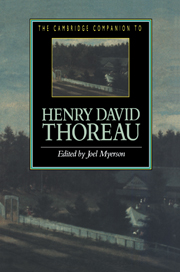Book contents
- Frontmatter
- 1 Thoreau’s reputation
- 2 Thoreau and Concord
- 3 Thoreau and Emerson
- 4 A Week on the Concord and Merrimack Rivers
- 5 Thoreau as poet
- 6 Thoreau and his audience
- 7 Walden
- 8 Thoreau in his Journal
- 9 The Maine Woods
- 10 A wild, rank place
- 11 Thoreau’s later natural history writings
- 12 Thoreau and the natural environment
- 13 Thoreau and reform
- Further reading
- Index
- Series List
12 - Thoreau and the natural environment
Published online by Cambridge University Press: 28 May 2006
- Frontmatter
- 1 Thoreau’s reputation
- 2 Thoreau and Concord
- 3 Thoreau and Emerson
- 4 A Week on the Concord and Merrimack Rivers
- 5 Thoreau as poet
- 6 Thoreau and his audience
- 7 Walden
- 8 Thoreau in his Journal
- 9 The Maine Woods
- 10 A wild, rank place
- 11 Thoreau’s later natural history writings
- 12 Thoreau and the natural environment
- 13 Thoreau and reform
- Further reading
- Index
- Series List
Summary
Thoreau is today considered the first major interpreter of nature in American literary history, and the first American environmentalist saint. This position did not come easily to him, however. Until almost a half-century after his death, he remained a rather obscure figure; and during his life and career - our main interest here - Thoreau had to struggle to arrive at the deep understanding of nature for which he is remembered today. He started adult life from a less advantageous position than we sometimes realize, as a village businessman’s son of classical education rather than as someone versed in nature through systematic botanical study, agriculture, or more than a very ordinary sort of experiential contact with it. Unlike William Bartram, Thoreau had no man of science for a father; unlike Thomas Jefferson, he had no agrarian roots. His first intellectual promptings to study and write about nature were from books, school, and literary mentors like Ralph Waldo Emerson. Though he celebrated wildness, his was not the wildness of the moose but of the imported, cultivated escapee from the orchard that he celebrated in his late essay, "Wild Apples."' Thoreau’s career in pursuit of nature thus became one of fitful, irregular, experimental, although increasingly purposeful, self-education in reading landscape and pondering the significance of what he found there.
- Type
- Chapter
- Information
- The Cambridge Companion to Henry David Thoreau , pp. 171 - 193Publisher: Cambridge University PressPrint publication year: 1995
- 5
- Cited by



